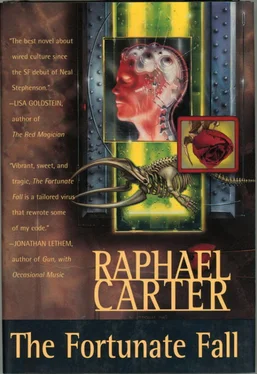Raphael Carter - The Fortunate Fall
Здесь есть возможность читать онлайн «Raphael Carter - The Fortunate Fall» весь текст электронной книги совершенно бесплатно (целиком полную версию без сокращений). В некоторых случаях можно слушать аудио, скачать через торрент в формате fb2 и присутствует краткое содержание. Город: New York, Год выпуска: 1996, ISBN: 1996, Издательство: Tor Books, Жанр: Киберпанк, на английском языке. Описание произведения, (предисловие) а так же отзывы посетителей доступны на портале библиотеки ЛибКат.
- Название:The Fortunate Fall
- Автор:
- Издательство:Tor Books
- Жанр:
- Год:1996
- Город:New York
- ISBN:0-312-86034-X
- Рейтинг книги:3 / 5. Голосов: 1
-
Избранное:Добавить в избранное
- Отзывы:
-
Ваша оценка:
- 60
- 1
- 2
- 3
- 4
- 5
The Fortunate Fall: краткое содержание, описание и аннотация
Предлагаем к чтению аннотацию, описание, краткое содержание или предисловие (зависит от того, что написал сам автор книги «The Fortunate Fall»). Если вы не нашли необходимую информацию о книге — напишите в комментариях, мы постараемся отыскать её.
“Gripping…. One of the most promising SF debuts in recent years”.
—“Publisher’s Weekly” starred review
The Fortunate Fall — читать онлайн бесплатно полную книгу (весь текст) целиком
Ниже представлен текст книги, разбитый по страницам. Система сохранения места последней прочитанной страницы, позволяет с удобством читать онлайн бесплатно книгу «The Fortunate Fall», без необходимости каждый раз заново искать на чём Вы остановились. Поставьте закладку, и сможете в любой момент перейти на страницу, на которой закончили чтение.
Интервал:
Закладка:
“That’s always been one of my favorites,” I said. “It’s so beautiful, how he renounces her.”
“Is that what you think it is? Renunciation?” She looked up sharply, mischief in her eyes. “I always thought he was trying to make her feel so guilty that she’d come back to him. ‘I loved you; maybe love has not been burned away completely in my heart, but don’t let that trouble you. I wouldn’t want to cause you any pain—’” She struck her forehead with her hand, overacting the role. “‘I loved you wordlessly, hopelessly, tormented by shyness and jealousy—you sure will be lucky if anyone else ever loves you like this—’”
I laughed; she rose into my arms. Pushkin, abandoned on the unblanked slate, kept his own counsel.)
“SEVENTY-FIVE PERCENT.”
(Two black cables twined, like snakes, between her fingers. We slotted the plugs into our wrists, then wrapped the cords around our arms, until we had just enough slack left to join hands across the table. She smiled to reassure me; closed her eyes in concentration. I sat watching her uneasily, wishing I had a hand free to scratch the itch above my spine socket. “What—” I said. She touched her hand to her lips to silence me, and then, her eyes still closed, began to kiss our knitted fingers. When she lowered our hands back to the table, their images remained there, pressed to her mouth. Her left hand also blurred, split, doubled. She sat four-armed, a Hindu goddess, concentrating, until at last her whole body pushed away its ghost.
For our ethereal bodies everything was effortless, all surfaces were smooth; the law of gravity became negotiable and all limits of endurance disappeared. She could lose herself for hours in this experience, disdaining flesh and bone. But I could never quite forget that while we kept up this illusion, our physical bodies were blind, exposed, in danger. The Postcops could have come upon us with ten men, a tank, and a brass band, and we would not have known to run. Then, too, I wanted to lie with her in that warm, comfortable fatigue that comes and wraps itself around you like a blanket. I wanted to curse—or bless—the surgeon that had given her a socket just at that spot that is perfect to kiss, at the base of the spine.)
“SEVENTY PERCENT”:
(Love was not a new joy, but an extension of old fears. I had given a hostage to life: as though a part of my own body had the power to move alone, unseen by me, where anything might happen to it. Walking through the city, every time I stopped to dodge some car that did not see me, I remembered that she too must walk her own streets, must avoid her own milk trucks. I walked in love as though I had a sparrow in my pocket, feeling the soft living warmth pressed against me, fearful lest by sitting down wrong I should crush it. Love was like an egg so fragile it would break if anyone suspected that it might exist.)
I took the suppressor chip from my frontal socket and jammed it into the temporal, trying to make it work again.
“Rejected,” noted Horus with indifference.
“Damn you!”
“That has already been taken care of,” Voskresenye said. Well, I hadn’t meant him, but him too. Then I thought: he was an old man. I could overpower him, I could make him make it stop. I stood up—
(And love fell from my hands and shattered.) “SIXTY.” (The pieces skittered under beds, slipped under countertops, ducked behind doorframes. It was roach love, furtive and opportunistic, scattering at the touch of light. We must meet less often; it was dangerous; and gradually our love became a patchwork, pieced together out of stolen moments, not quite long enough to keep us warm. Fierce encounters, and fiercer because rare: it was love boiled down to drams and drunk from thimbles. And crying out, I would wake from sleep, thinking I had felt some token of her presence—the touch of her hand on my cheekbone, the creak of her foot on the stair.)
If I took out the 6000s with the suppressor still in—
“Removal of Series Six Thousand moistware during desuppression may be harmful or fatal,” droned the god.
“You’re bluffing,” I said, but without conviction. All right then, if—
“FIFTY PERCENT”:
(How could she say that? “Feel no regret for roses,” she had said to me, kissing the nape of my neck as I bent over her latest translation of Pushkin. “Feel no regret for roses, autumn too has its delights….” How could she say that? Didn’t she see that for us there could never be autumn, that we could never sit, as anyone else could sit, beside the fire all day on Sundays in November; that September’s leaves, that fall for man and beast alike, were not our leaves to walk in; that October storms would never find us sharing an umbrella? The love of spring had thrived on wine and candles; now in the August of our lives, we needed newspapers and comfortable chairs. But it was impossible. No autumn—only a cold wind that blew through our summer, freezing the leaves in their places before they could motley and fall.
But I said none of this. I only nodded, and looked down into Pushkin’s autumn through the black rows of KRIOL parentheses, like looking at the sky through prison bars.)
I came back to myself; but I no longer thought of escape. It was too late, there was no time to think. Like a woman drowning, I could only take one gasping breath before I sank again.
“FORTY PERCENT”:
(The leaves, frozen fast to the trees, began to rot. We could not live together; it was much too dangerous; we discussed it twice a day and agreed every time. We found ourselves putting off seeing each other, because when we met we were only reminded of what could not be. Our days were barren of companionship, our furtive meetings dry of joy.)
“THIRTY”:
(And finally there was nothing else. We must try it, and risk everything, or part. And so she took her pilgrimage to Zanzibar, to seek a certain sliver of illegal moistware. I did not see her off at the gate. For a week, awaiting news, I paced through my shrinking apartment. Now the time for her return had come and gone, and there was nothing; I sat shivering on the bed, certain that she had found asylum and that I would never see her again. And then the news came, in the form of a postcard from the Leningrad train-port. When I saw it on the vidphone’s list of messages, I caught my breath. I entered my passphrase, switched on isolation, and turned up the tempest. It was a generic scene of Africa—misshapen trees, corkscrew-horned buffalo—on which a noncommittal message had been scrawled. I hit “decrypt,” and watched the colors shift and reassemble:
I !pri !zhis mya !=lu@mya
Native KRIOL. I only spoke interpreted. I pounded the Translation key and saw:
and(!come(!live.with(me)), Come live with me and be my (!=love(my))) love
What had been complex was suddenly made simple. Of course I would agree, I could do nothing else. I would go to her, and for a year, or two, it would be everything we’d hoped for. With her African enhancements she would cut through the Net like an arrow through air, and nothing would be able to withstand her. Soon she would grow too confident, and think herself invulnerable. And on some undistinguished day, we would be lying in bed late in the morning, idly debating whether 10 A.M. was a good time to get up, and agreeing in the end that it most certainly was not; and there would come a knocking at the door. She would throw on clothes and answer, as I went to brush my hair. And as I looked at my disheveled image in the mirror, with fond distress, I would see a man in black come up behind me. He would lead me away; she and I would be transported to the station in separate cars, and would stay there a few days in separate rooms, and then be taken again in two cars to two different places, and be buried, each alone.)
Читать дальшеИнтервал:
Закладка:
Похожие книги на «The Fortunate Fall»
Представляем Вашему вниманию похожие книги на «The Fortunate Fall» списком для выбора. Мы отобрали схожую по названию и смыслу литературу в надежде предоставить читателям больше вариантов отыскать новые, интересные, ещё непрочитанные произведения.
Обсуждение, отзывы о книге «The Fortunate Fall» и просто собственные мнения читателей. Оставьте ваши комментарии, напишите, что Вы думаете о произведении, его смысле или главных героях. Укажите что конкретно понравилось, а что нет, и почему Вы так считаете.












